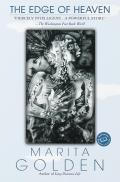It’s been a few years since I read this novel by the incredible Marita Golden. In her work she consistently takes on issues so delicate that most are afraid to discuss them at all. Golden approaches them with intelligence and humanity, forcing us to envision and inhabit lives that may be different from our own. To me this is what make literature one of the highest callings: that it nurtures our empathy.
The story opens with twenty-year-old Teresa Singletary and her mother, Lena, facing a major turning point in their lives: Lena is being released from prison.
As Teresa’s grandmother (and Lena’s mother) Ma Adele says, “‘She’ll need you to love her, love her to the bone.’” But Lena isn’t at all sure she’s ready to do that. She bitterly resents the losses that her mother’s actions caused and misses the father who left them shortly before events spun out of control. Ryland has been too absorbed in his own grief to be much of a father to Teresa, leaving her to Ma Adele’s steadfast care.
All of these characters have a turn, as the story moves between Teresa’s first-person point of view and the third-person point of view of the others, particularly Lena. Their actions and memories balance Teresa’s and add context and depth.
Through this “chorus of voices” as Golden describes it in the Reader’s Guide, the story conveys the terrible damage not just to the person imprisoned, but also to her or his family. This theme is what brought me back to this book, now when it seems as though our society may finally be ready to confront the massive racial inequality in the U.S. prison system.
I’ve learned so much from Marita Golden’s workshops. Her skill is evident on every page. Look at how Ma Adele is introduced. About to leave for work, Teresa stops to see her grandmother, entering a bedroom full of plants and flowers. “Some days I heard her behind her door conversing with the plants. She had names the cactus Butch and the azaleas that hung from the ceiling Aretha.” From this we get a picture of Ma Adele as nurturing and having a sense of humor.
Further we find that she is still in bed reading the newspaper, signaling an active intellectual involvement in the world. “The TV remote control, a paperback mystery, an aged, tattered leather phone book, knitting needles, a ball of yarn, and a stack of bills littered my grandmother’s bed.” We are reminded that Ma Adele is perhaps tired, spending much of her time in bed, a woman asked in her old age to raise another child.
Among the litter on the bed is a stack of letters from Lena. Teresa says, “Each time I looked at my grandmother’s face I saw the shadow and the promise of my mother and myself.” By now we know how complicated her emotions are about this seemingly commonplace observation.
This is just one example. The story takes us deep into the history of these individuals and their experience as a family. While the journey is sometimes dark and the human cost is huge, it is in the end a story of love’s possibilities.
I hope with all my heart that we can learn to live inside the lives of others and, seeing the world as they do, make better choices. Stories such as these help us get there.
What novel have you read that illuminated a life different from your own?

